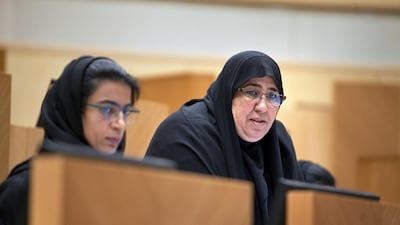ABU DHABI // Former school principal Aisha Al Yammahi took many by surprise with her outburst in the Federal National Council three years into her four-year term.
After her appointment in 2011, expectations were high. She was singled out in Fujairah by the emirate’s Ruler to join five other appointed women on the FNC. Sheikha Al Ari, who was elected, was also a former school principal.
Once all members took their seats, with Ms Al Yammahi preferring to remain seated on the council’s right side in the back row, she seemed to do little more than join in council voting and attend sessions.
Possibly overshadowed by her more vocal and bolder male counterparts, she had yet to add any council achievements to her portfolio – other than questioning why water was over-chlorinated in the north. That is, until April 23, last year.
It started out like any other FNC session. Once the bell rang at 9am, signalling the start of the session, attendance was taken. Then, Ms Al Yammahi stood up to the Minister of Education, Humaid Al Qattami, to vent her outrage over a change in teacher evaluation that had led to pupils lagging behind with falling grades.
“Grades have deteriorated in subjects like physics and Islamic studies … because there is no proper training for the exams,” she said to the minister. “The teachers are not able to answer proper questions because there’s no oversight. There is a need to reconsider this because the principal is not the right person to perform evaluations.”
Before the 2012-13 academic year, the ministry would send supervisors to check on classes, evaluate teachers, oversee class activities and check on the accuracy of the information being taught.
After the evaluations stopped, teachers were free to teach what and how they pleased, Ms Al Yammahi said.
“Now the ministry’s role is just overseeing,” she said. “They come once or twice a year only for about 10 minutes. Who will evaluate the teachers?
“My question will be who will make sure that facts given to the children are accurate?”
The minister said evaluations would resume the following year. Ms Al Yammahi again stood to respond to him. She insisted the delay was damaging for pupils.
Although this was the first stand for Ms Al Yammahi, it was not the last. Recently, she stood again to address the Minister of Education and demanded pay rises for school staff, just like 7,000 teachers who were given raises in 2012. The minister said the matter was being looked at with the Ministry of Finance.
During a debate on the country’s media policies, Ms Al Yammahi told Sheikh Abdullah bin Zayed, the Foreign Minister and head of the National Media Council, an English fluency requirement for journalism students was causing them to ignore journalism. According to 2011 statistics, only one had entered journalism at UAE University and 10 at Zayed University.
Sheikh Abdullah replied saying that media graduates needed to be fluent in Arabic and English.
osalem@thenational.ae

